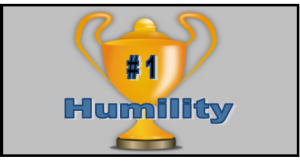Humility is Key to Becoming a Winner
 We live in a world that exalts winners.
We live in a world that exalts winners.
From politics to the Final Four to Dancing With the Stars, it’s all about who comes in first. Everyone else is a loser.
And if you’re a winner, you should let everybody know. Put it in all caps on your website. Tell the world how big a winner you are, because winning is what it’s all about.
Whatever happened to humility, asks thought leader Bill George.
Humility and Leadership
By any measure, George is a winner. He is a Senior Fellow at Harvard Business School who has taught courses in leadership since 2004. He is the author of four best-selling books: 7 Lessons for Leading in Crisis, True North, Finding Your True North, and Authentic Leadership.
In this blogpost, George says humility is often misconstrued as meekness or false modesty. He says it actually is a sign of strength.
“Humility is an essential quality for authentic leaders. People trust them because they know they are genuine, honest, and sincere. Lacking those qualities, people live in fear and doubt - not exactly the ingredients to bring out the best in people. In difficult times, people rely on humble leaders even more to get them through crises.”
Humility is an essential quality for authentic leaders. People trust them because they know they are genuine, honest, and sincere.
The strongest leaders are humble, George says: “[They] are keenly aware of their limitations and the importance of teams around them in creating their success. They know they stand on the shoulders of giants who built their institutions. Their job is to build teams of leaders capable of taking their organization to higher levels in order to cope with today’s fierce demands. They exhibit humility in their actions and interactions, yet are passionately committed to the success of their enterprises.”
Outer Projection of Inner Worth
Humility also indicates strong character.
“Humble leaders are grounded by their beliefs, their values, and the principles by which they lead,” George writes. “Ultimately, they know to lead is to serve their customers, employees, investors, communities, and ultimately, society through their work. Every day leaders are closely scrutinized for their words and their actions, as they become role models for people inside and outside their organizations. In contrast, leaders who brag and tout their achievements often do so from a deep sense of insecurity. Outwardly, they act like bullies and try to intimidate people, but inside they feel like imposters who may be unmasked at any time.”
One reason I was drawn to George’s post is that he readily confesses to not always practicing what he preached.
“For much of my life, no one would have considered me humble. To the contrary, I felt the need to push myself forward through my accomplishments, to be recognized for my achievements, and to express confidence that I could solve any problem presented to me. In part, these characteristics stemmed from fear of being rejected by others or bullied by powerful personalities. In my early years it was hard to admit my mistakes without rationalizing them or to say simply, ‘I don’t know.’”
Over time, he says his confidence grew. He no longer felt a need to impress others and have all the answers. He learned to freely admit mistakes. He began seeing vulnerability as power. He became a leader and teacher.
He practiced humility, and in the process he became a winner.
Sources:
- Huffington Post http://www.huffingtonpost.com/bill-george/are-our-leaders-losing-th_b_9423986.html
- Big Think http://bigthink.com/videos/bill-george-on-authentic-leaders




